The Jamie Cassels scholarship funds original undergraduate student research
UVic’s Jamie Cassels Undergraduate Research Awards (JCURA) encourage undergraduate students in all disciplines to pursue original research. The award was established in the 2009-10 academic year by then-Vice-President Academic and Provost, Jamie Cassels. Successful recipients of JCURA receive a $1 500 award and the chance to present their research at an annual fair.
The Martlet attended the research fair on March 19 to learn more about the exciting and important work UVic undergraduates are currently undertaking.
Dana Frederick — Department of Anthropology

Photo by Ethan Barkley.
Dana Frederick is a fourth year anthropology student with a minor in Latin American studies.
Her JCURA project, “Reframing Food Sovereignty in Eastern Cuba: Resilience and Agency Among Small-Scale Farming Communities,” looks at Cuban farmers’ efforts to mitigate food scarcity. As part of her research, she spent six weeks in eastern Cuba in 2023 and 2024, interviewing small-scale farmers and engaging in participant observation.
Frederick said her research focused on the framework of food sovereignty — the right for people to control the modes of production and distribution, and to find culturally appropriate food. Exploring food sovereignty in a non-capitalist context is a novel aspect of her research.
“Food sovereignty discourse, at the moment, is … framing food sovereignty as an act of resistance against capitalist industrial agriculture,” she said. “Looking at it through a socialist system adds a bit of nuance to this, because Cuba is often treated as a success story because they have state-led agricultural reforms.”
Frederick said that economic crises are impacting access to food in Cuba. These small-scale farmers must navigate trade embargoes against Cuba and the lasting impacts of the COVID-19 pandemic.
As part of her research, she looked at how small-scale farmers interact with the black market. Many of the participants in her study must meet production quotas for work on state-given land, but often sell the excess on the black market.
“[It] really calls your attention to engagement alternatives such as the black market, and agency and resilience on the individual level,” Frederick said.
Sabrina Magnus — School of Public Health and Social Policy
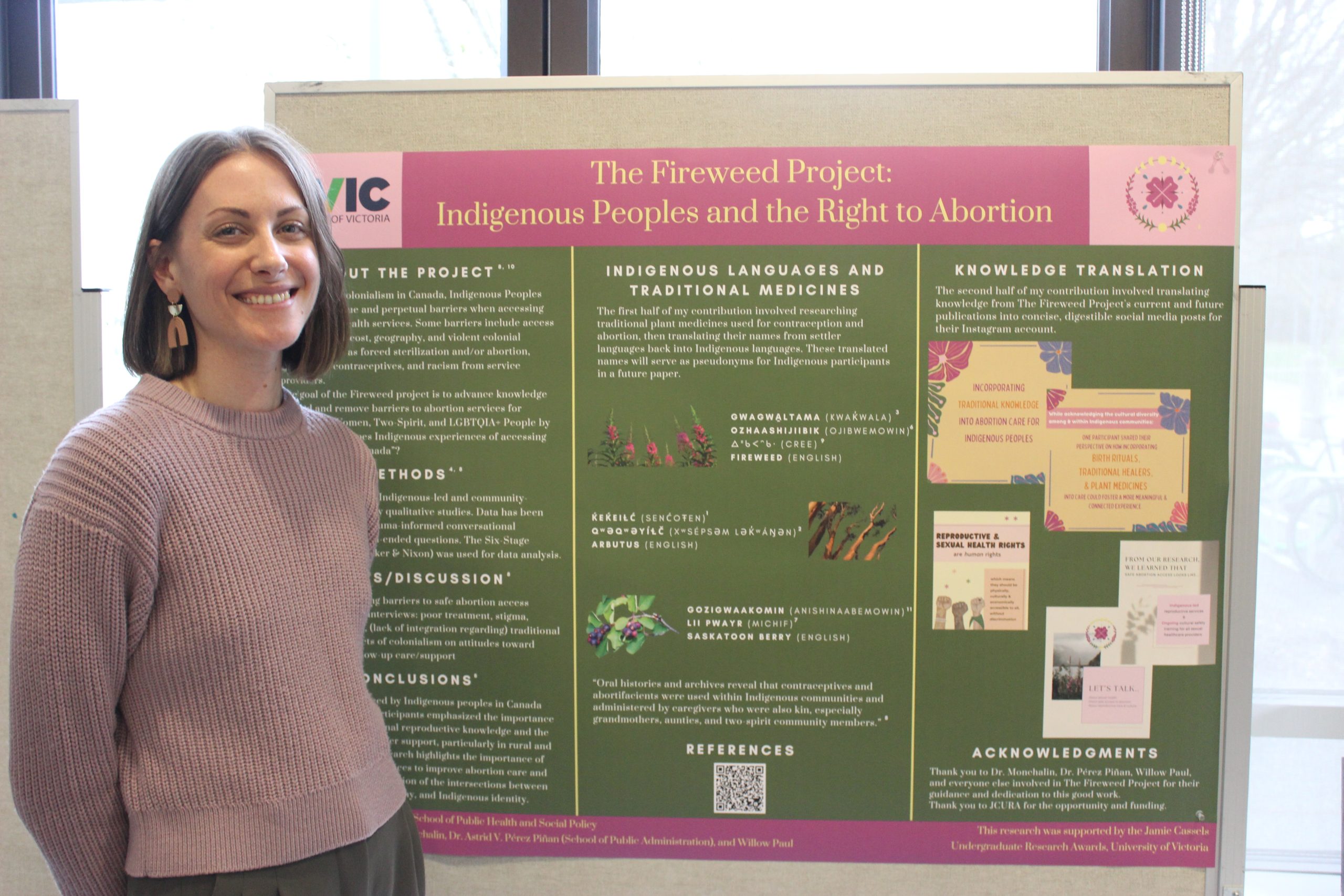
Photo by Ethan Barkley.
Sabrina Magnus is a fourth year student in the School of Public Health and Social Policy. Her JCURA research project, “The Fireweed Project: Indigenous Peoples and the Right to Abortion,” examines how colonialism has caused unique barriers to reproductive health services.
The Fireweed Project is a larger research project based at UVic, aiming to “learn from Indigenous women, Two-Spirit, and LGBTQIA+ community members who have accessed or tried to access an abortion … with the hopes of improving the culturally safe service gap in Canada.”
Magnus’ research involved interviews about the specific barriers that Indigenous women, Two-Spirit, and LGBTQIA+ face when accessing reproductive health services.
“The barriers that emerged from the interviews were poor treatment and stigma and healthcare, particularly racism, and logistical barriers. A lot of Indigenous communities, particularly First Nations on reserve, live in remote areas, so it’s incredibly difficult to make it into the places that have the medical care to provide abortions,” she said. “It’s expensive to get flights.… It’s expensive to have accommodation. It’s expensive to get childcare.”
Magnus’ research also examined colonialism’s impact on attitudes toward abortion. “A lot of cultures who historically use traditional medicines to have abortions and contraception have turned away from that,” she said. “Not all, but some, and that largely has come from the impact of residential schools. So that then makes it hard for people who maybe need help from family members or community members.”
Part of Magnus’ research involved looking into these traditional medicines and “translating their names from settler languages back into Indigenous languages.” Another aspect involved converting existing Fireweed Project publications into concise social media posts for the project’s Instagram.
Magnus said that the Fireweed Project is now reviewing recommendations for moving forward. “So how do we integrate culture into abortion care, having maybe traditional healers or birth rituals or reintegration of traditional medicine and plants?”
“The point now is to gather some recommendations to be able to go to policymakers [and] continue this conversation on a broader level,” Magnus said.
Shannon Sherk — Departments of Sociology and Environmental Studies
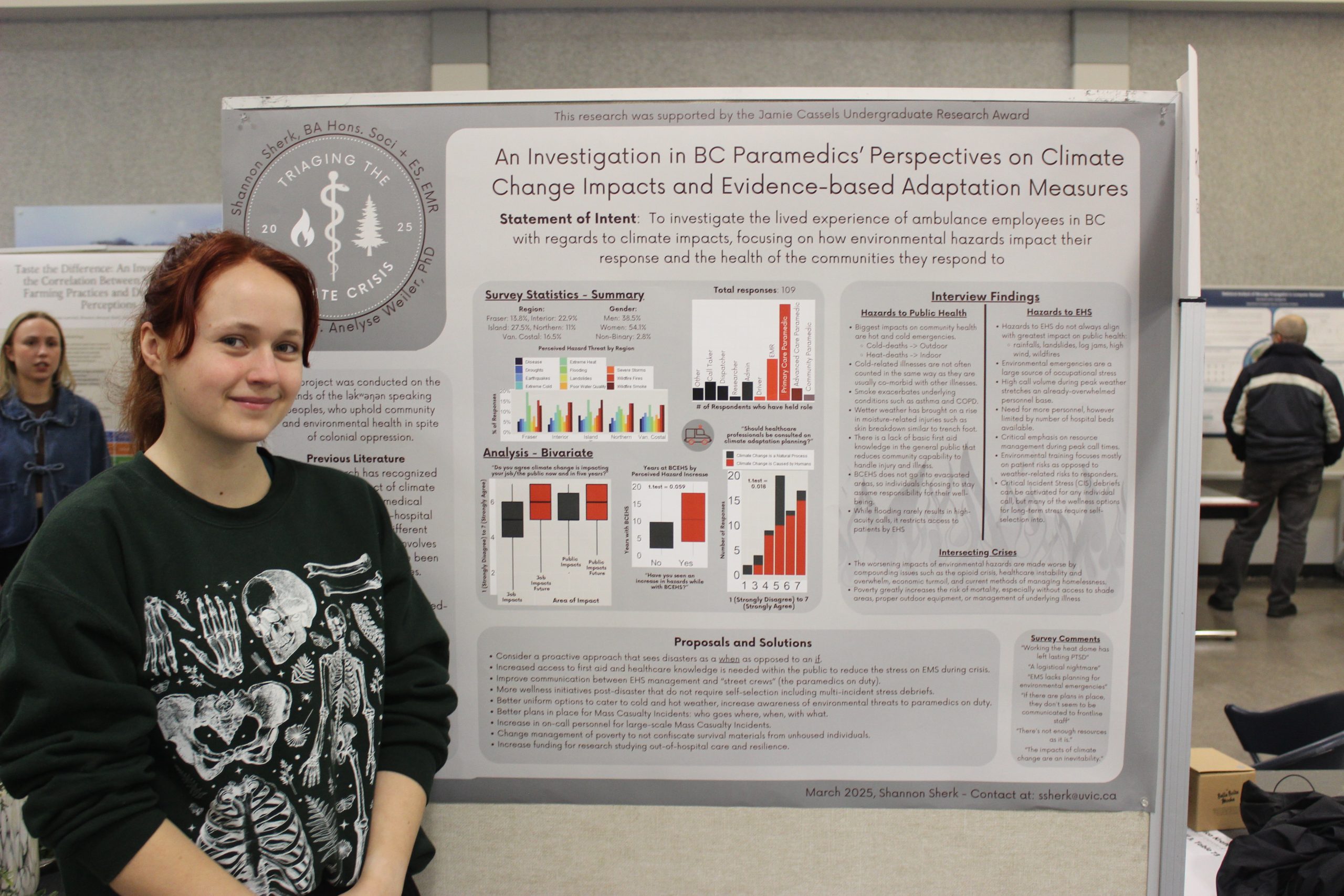
Photo by Ethan Barkley.
Shannon Sherk is a fourth year sociology and environmental studies major. Their JCURA research project, “An Investigation in BC Paramedics’ Perspectives on Climate Change Impacts and Evidence-based Adaptation Measures,” investigated the personal experience of ambulance workers with regard to climate change.
According to Sherk, while the impact of climate change on clinical medical personnel — like those working in a hospital or care facility setting — has been studied, pre-hospital personnel like paramedics have not received the same attention.
“There is a lot of research on hospital staff during disasters, [but] relatively little on the people who don’t have nice, air-conditioned offices,” they said.
Sherk volunteers with St. John Ambulance, and plans to become a paramedic after graduating, so this research is especially close to their heart.
Their project used quantitative surveys and interviews to find out what climate-related hazards paramedics see both to public health and to themselves, and focused on what policy solutions they want implemented.
It revealed that environmental emergencies like the heat dome are a large source of occupational stress and sometimes post-traumatic stress disorder (PTSD) for paramedics. Additionally, Sherk found that the environmental and extreme weather training paramedics receive is often tailored towards preventing risks to patients, but neglects the same risk to paramedics themselves.
“The biggest thing is to treat disasters as something that is becoming inevitable, as opposed to an ‘if,’” said Sherk. “For example, the heat dome — there was relatively little heatwave policy prior to it. Basically all of it was created retroactively afterward, and that caused a significant increase in loss of life.”
Molly Mifsud — Department of Psychology
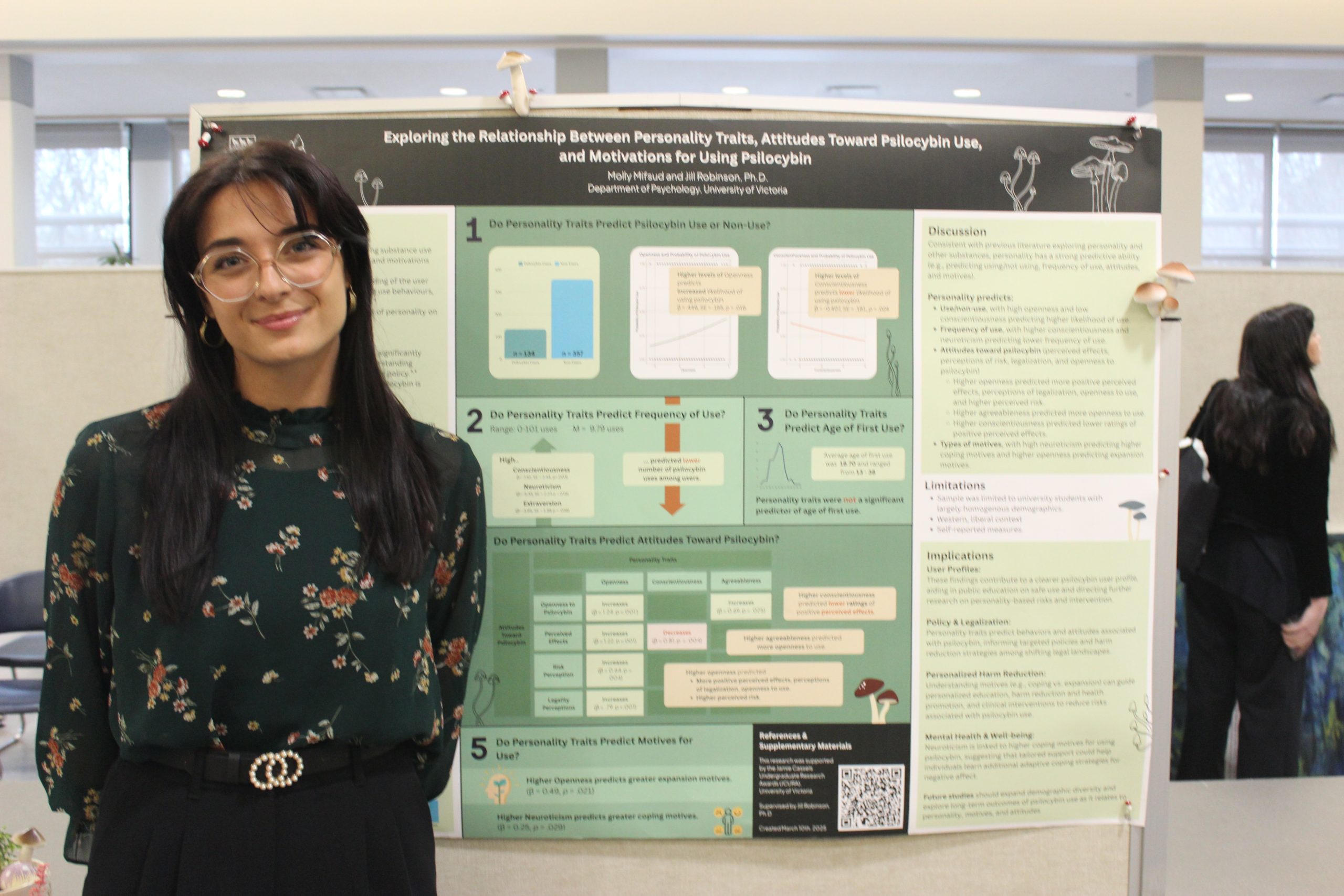
Photo by Ethan Barkley.
Molly Mifsud is a fifth year psychology student. Her JCURA research project, “Exploring the Relationship Between Personality Traits, Attitudes Toward Psilocybin Use, and Motivations for Using Psilocybin,” examines how these factors influence psilocybin use. Psilocybin is a psychedelic compound occurring in many species of fungi, commonly referred to as “magic mushrooms.”
“The need for this research just comes from the shifting legal landscapes around psilocybin and other psychedelic substances, because within all of this change, we still don’t have a very good idea of who’s using the substances and why,” said Mifsud.
She said that focusing on personality traits, attitudes, and motivations has been useful in understanding use patterns and outcomes with other substances. For this project, she conducted a survey of 500 students at UVic, using the Big Five personality traits index — openness, conscientiousness, extroversion, agreeableness and neuroticism.
“We found [that] higher levels of openness predict increased likelihood of use over the lifetime, and higher conscientiousness leads to lower likelihood of use,” she said. Additionally, conscientiousness, neuroticism and extroversion were associated with lower frequency of use. Mifsud also found that higher openness was associated with a more positive view of psilocybin, as well as higher risk perception.
“What this tells us is that even though people who have a more general positive view of psilocybin, they also understand the risks involved,” she said.
Other findings included how personality traits predict motives for use. Higher openness led to more participants using psilocybin for “expansion motives” — things like creativity — whereas higher neuroticism was more closely tied with use as a coping strategy.
Mifsud said that these findings can play an important role in harm reduction, in both healthcare and recreational settings. “Looking at these factors is super important to understanding why someone’s going to have the outcome that they do,” she said.
Next, Mifsud wants to do a qualitative analysis of the 500 survey responses. “Hearing the stories behind all 500 of those people, it’s going to be really fascinating to understand what this all means.”
Julianne Hofstede — Department of History
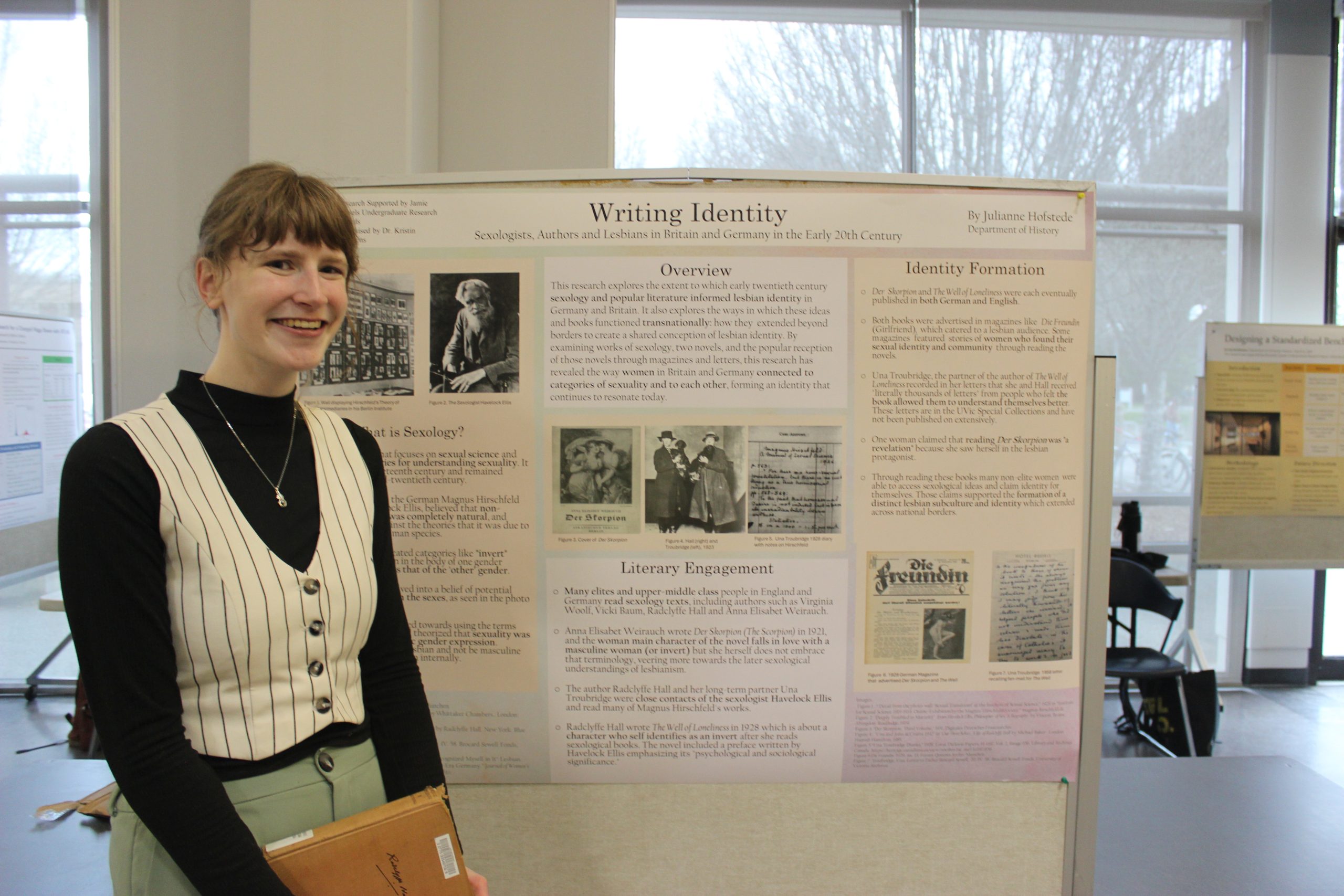
Photo by Ethan Barkley.
Julianne Hofstede is a fourth year history and English double major. Her JCURA project, “Writing Identity: Sexologists, Authors and Lesbians in Britain and Germany in the Early 20th Century,” examines the influence of both sexology and popular literature on the formation of lesbian identity in these two countries.
Sexology emerged in the late 19th to mid-20th century, studying sex and sexuality within a scientific framework.“It was really broad, and they studied a lot of different things, including birth control and eugenics,” said Hofstede.
Hofstede’s research focused on sexual identities and categorization created in the late 19th century. “The main category that is relatively transnational was sexual inversion … they conceived of it as homosexuality with a biological basis, but it’s kind of like a combination of today’s conceptions of homosexuality and transgender,” she said.
Hofstede found that sexology studies, and popular books like Der Skorpion (The Scorpion) by Anna Elisabet Weirauch and The Well of Loneliness by Radclyffe Hall, were shared widely in both Britain and Germany, creating a shared conception of lesbian identity in both countries. Her research examined these novels, sexology studies, and other primary evidence such as letters and magazines.
“People really identified with the books — the partner of [Radclyffe Hall] said that she received thousands of letters from women who identified themselves with the main character. And The Scorpion was really popular in lesbian periodicals at the time, and some periodicals featured stories of women who read The Scorpion and discovered their identity and then fell in love with a woman.”
Hofstede said this project was important because “finding connections between places and more of what unifies groups rather than separates them can be really important and impactful, and to not recognize the similarities between ourselves and those of the past and those of other places is kind of to miss the most important part of history and human empathy.”
Shawnda Wilson — Department of French and Francophone Studies
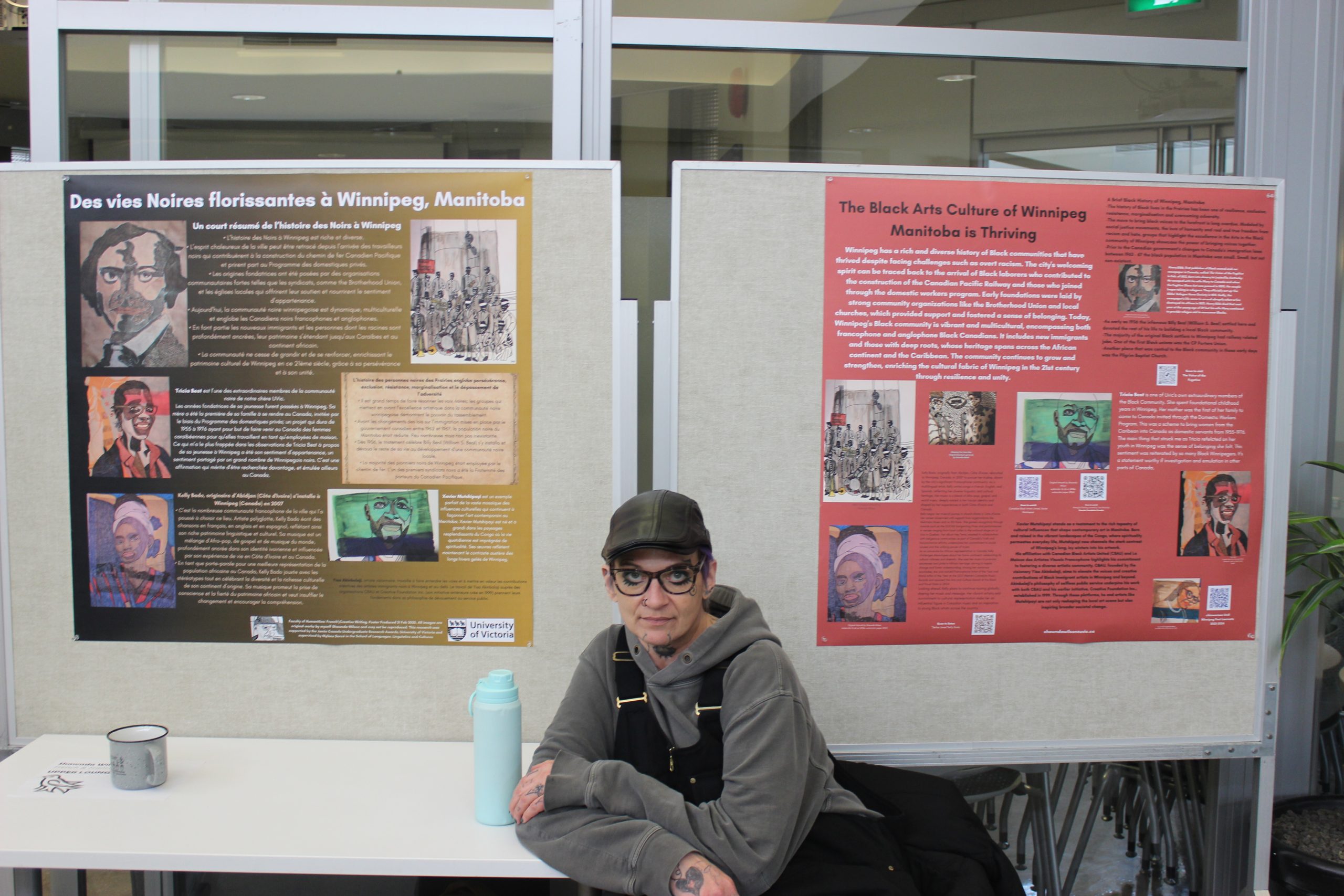
Photo by Ethan Barkley.
Shawnda Wilson is in her last year of a degree studying the French language, linguistics and creative writing. Her JCURA research project, “The Black Arts Culture of Winnipeg Manitoba is Thriving,” examines the resilience of Black creative communities — particularly the sizeable Black francophone community in Winnipeg, from its historical origins during the construction of the Canadian Pacific Railway to today.
Wilson said she was drawn to this project during trips to Manitoba, where she met a number of Black francophones and wondered, “Why Winnipeg, of all places in the world?” She was also inspired by a Canadian Black History course she took through the Department of French and Francophone Studies, where she encountered the music of Kelly Bado — a multilingual artist based out of Manitoba.
Her research was supervised by Dr. Mylène Dorcé, Assistant Professor of Francophone African and Caribbean Studies. In addition to Bado, Wilson’s study of Black artists in Winnipeg included Chimwemwe Undi, the Winnipeg Poet Laureate for 2023 and 2024, visual artists Yisa Akinbolaji and Xavier Mutshipayi, and organizations like Canadian Black Artists United (CBAU) and La Maison des artistes visuels francophones.
The project involves a brief exploration of Black history in Winnipeg, followed by a focus on individual artists and community members. One thing that stood out to Wilson was how many individuals felt a strong sense of belonging. “Every single person that I interviewed and spoke to said that they felt welcomed right away … which is not generally the experience in Canada,” she said.
“There’s this massive arts culture — visual arts, spoken word and music — that exists in Winnipeg … that nobody seems to know about within Canada,” Wilson said. She was drawn to this research out of a belief that both francophone and Black voices are underrepresented in Canada.
“I don’t think people talk openly enough about what it is to be someone who is an outsider to the white majority [in Canada].”
For students interested in pursuing undergraduate research, the 2025-26 JCURA competition has not yet started — there is still time to come up with an original research project. The most up-to-date information can be found on the JCURA website.







